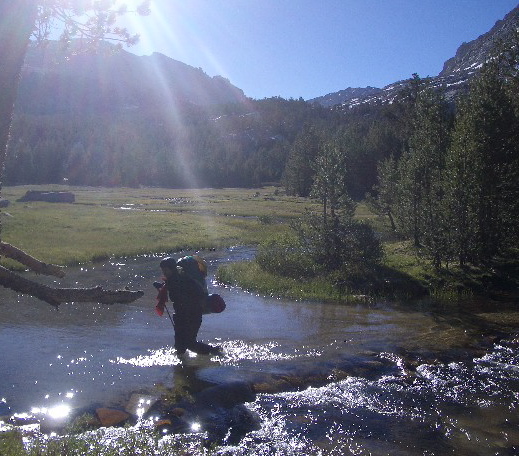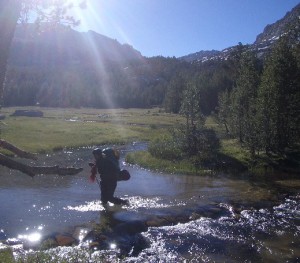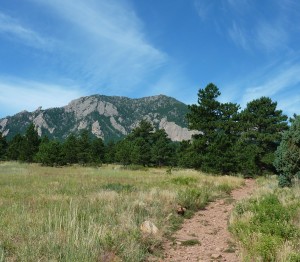An article by Matt Richtel in The New York Times, “Outdoors and Out of Reach, Studying the Brain,” shares the experience of five neuroscientists who spent five days without computers and cell phones, rafting a river in Utah. At first, the scientists were divided on whether heavy use of digital technology took a toll on attention and focus. Flowing down the river, they felt the freedom and clarity of not being electronically interrupted. By the end, they brimmed with fresh ideas for their research. Was it from the quiet, the exercise, or nature itself?
In my own experience hiking the 2,663-mile Pacific Crest Trail with my husband, Porter, I felt a synthesis of all three–mind and body in nature. Nearly six months without cell phones or computers allowed for a deep interior rest, even as we struggled to hike twenty-plus miles a day over mountains, across deserts, and through rivers. Our attentiveness grew at once sharper–to navigate, find water, watch for mountain lions and bears–and more intuitive, sensing our way into the wilderness.
How did nature affect our minds? Immediately after our return, we were able to make a series of complex decisions with refreshed analytic powers as well as trust in the spontaneous flow of life. Our lives changed in ways we were suddenly ready for. We moved to Boulder, Colorado, where outdoor adventure is a vital part of our days. Having left his old job to hike the Pacific Crest Trail, Porter found deeply satisfying work in hospice and palliative medicine. I spend part of the day hiking in the Foothills of the Rockies, and part at the computer to bring the wordless knowing of nature first to consciousness and then into language, through my book and blog.
Our digital technologies, from devices to social media, reflect our longing to connect. They’re not an end but a means to relatedness with each other and the world. For a direct connection unmediated by technology, listen to the wind, feel the bark of a tree, look into the sky or into the eyes of another. Fall silent. That’s nature.








What an elegantly written testament to the benefits of getting away from the electronic buzz that is backdrop to modern life. Thanks for reminding me it’s time to go for a hike.
Gail, you have it on something I believe deeply…. we carry too much “baggage” both mentally and physically. We have too much “stuff” …. shed it and get back right ! I am glad you all made this trip. Whatever it takes we all must clean out the attics our our minds.
Thank you for sharing a valuable reminder on this glorious day.
Love this! Nature is sooooo healing and soothing!
Gail,
Thanks for your reflections on spending time in nature and without electronic gadgets. I wonder how future generations will be affected by being plugged in 24-7, without time for contemplation, in superficial on-line relationships, and never looking up to see the natural beauty around them. It’s scary.
“Fall silent. That’s nature.” Lovely. I read the article in the Times, & really stopped to think about the scientist who got his grant & needed to know right away. It would still be waiting when he got back. Knowing just might make him exuberant, but also partly thinking about what to do with it. You & Porter made your decisions after–I love that!
Thanks, Gail.
Thanks for your informative and uplifting testament to the restorative power of being out in nature!
It makes me happy! I spend much of my time outdoors, climbing in summer and skiing in winter. When I get up and walk outside my tent, it’s so beautiful around me.
This is what both ecopsychology and contemplative traditions have understood – the value of dropping beneath the chatter into direct contact, unmediated by language. Nature is the Good Mother, holding us so we can let go. Thanks, Gail.
What a great insight, Jasmin. I appreciate your comment and am looking forward to your own book and upcoming signing at Boulder Book Store.
Ah, Gail, you talk of drawing attention to life! Being in that moment, and getting from it all that it offers, is powerful. By turning off the gadgets, we can see and hear what surrounds us whether trees and wind or faces and voice of others.
All good wishes!
Amazing that most of us have only had cell phones for less than a decade, email and then mobile email for much less than that. I feel dependent on my devices and, depending on the situation, it is at first frustrating and then freeing to be in areas where my phone doesn’t work. Add in the grandeur and silence of nature and it must be good for my brain.
Gail, this is a beautiful reminder and a balanced look at how being in and with nature affects our psyches and our quality of life – without demonizing the computerized world we live and work in. I especially love this line: “to bring the wordless knowing of nature first to consciousness and then into language” – as a a brief statement of what you do with your writing and how you live your life.
I am really looking forward to reading your book when it comes out, and I’m grateful for these delicious tastes of your words and insights in your blog.
Thanks, I’m fascinated by all these comments and your own experiences with the natural world.
Gail, thank you so much for the link to a compelling article and your own personal insights. We’ve been talking about and around this topic all summer–there’s a growing phenomenon of technology addiction and dependence to which we’re all so vulnerable. I get anxious going just minutes out of reach from texts, voice mails, and e-mail sometimes. Luckily, nature is such a wise and compassionate healer, and it just takes a moment of breaking free to recapture the contentment and appreciation that comes from it!
Sometimes it takes for less than six months and 2,663 miles to be “away.” Earlier this week, I was away from home for less than 24 hours without netbook or laptop — and that felt like (relative) liberation. A long hike in the high country tends to have that same effect on me. On those rare occasions in recent years, after I’ve been out of electronic touch for a couple of weeks, I find so much piled up in my inbox that the benefits of being unhooked from the electronic world are washed away in a heartbeat as soon as I start tackling it all. I admire your ability to set such a phenomenal goal and gaining such insight from achieving it.
I like the very personal quality of your blog. There are many blogs about nature, but when you write about yourself (and Porter), the words and images leap off the page. Keep going!
Thanks for the great post, Gail. I had no idea you took that trip with no technology. I agree that there is a deep sense of “I can” that comes from challenging myself in nature that I don’t get from juggling a bunch of wired tasks. When I can’t get out there myself, reading of another’s journey takes me back to that space of “ahhhh.” I look forward to reading more about your experience.
Gail,
I just climbed Mt. Sneffels, near us, and had one day similar to what you’re describing, in high clear cool air. Over the last week, that sensation of scrambling up rock after rock in the scree, seeing the landscape shift, the peak grow nearer, the surrounding peaks worn away like petrified trees, keeps returning. I look forward to your book, very much, and am in complete agreement with your idea that desire connection is at the heart of picking up the cell phone — but never does it do it. Thanks for posting this.
I’m always happiest outdoors, and have been camping and climbing in Idaho and Canada since late July. that’s over a month of living in a tent! I miss only showers ….
Hi Gail, you write about nature and hike in the hills of Denver & Boulder too? Very cool. What did the scientists in your article conclude? Was it nature or was it just being away from the electronics? I’ve seen studies that point to both – that multitasking between email and cellphones and other activities actually makes you momentarily stupid (yes, I’m not joking. It’s the equivalent of being high). I’ve also read about studies that point out that being in wilderness is a good way to de-stress and gain perspective about your life.
If you’d ever like some company on your hikes, please join my Contemplative Hiking MeetUp. The link is on my website under “group hikes”: https://www.contemplativehiking.com. We hike in silence for the most part so we can fully appreciate our surroundings, and each hike has a different theme or lesson related to ecopsychology or mindfulness practice.
Margaret, the scientists didn’t come to conclusions but opened to new questions, always a good thing whether for research or not. I appreciate your own blog about nature and contemplation, and your MeetUp group is a great idea.
Dear Gail, Oh my, this is wonderful….both the article and your insights. We’re so grateful to have the summers in Crested Butte to give us this extended experience in the mountains where we can live much more at the pace of Nature…that spontaneous flow you mentioned. Also I went to the Benedictine Monastery in Snowmass for several days and that was very special. I love to hike and look for metaphors in Nature. In their own way they offer clarity in a way that is not dot to dot.
Special hugs to you and Porter and Amber, Delrena
I am sitting outside in the gloaming as the moon comes from behind my neighbors huge Ponderosa. Between nature and contemplating gratitude I feel I potentially always have a very full plate to feast on.
Having had a bum knee the last few years has certainly added new challenges to contemplating my plate….
Thanks for your reflections; I have experienced too few times of the level of sensitivity you reached with your journey. I am glad for the reminder. Sandy Ebling
This past weekend I stayed at a cabin in the mountains completely “unplugged.” I had a lot on my mind and the beauty and serenity of nature seemed to absorb and soothe my thoughts. I hiked, read, ate, just stared out into the deepness of the sky, the majesty of the tree-covered slopes, and let go. It was wonderful. I’ve long believed that there is an “energy” exchange that takes place between humans and nature that is at least partially blocked when we are in our concrete canyons. To also let go of the need to be electronically connected and multi-tasking constantly just enhances that exchange. I can’t wait to read your book as what I’ve heard at readings has made me eager to know more!
Rosemary, I’m so glad to read your comment. I’ve often wondered how you restore yourself in light of your huge contributions to social media, and your own writing for your excellent book and blog.
hi Gail, this is most interesting – urban life with its distractions does remove us from nature and your piece with reference to the article reminds the urban reader to ensure time is taken for the important connections; your trek is so impressive – a shorter one of 500 miles in Northern Spain is the Camino de Santiago de Compostela, I know a couple of people who did that and one who is en route as I write this note – I can do it in my mind, having just read an account by Jane Christmas in her book “What the Psychic Told the Pilgrim”; best regards.
I saw the same New York Times article and am glad you picked up on that theme. I believe we all need more quiet time to reconnect with ourselves and am glad you had that experience while hiking the Pacific Crest Trail.
Hi Gail: You put your finger on an important problem–how technology addicts and clutters the mind and the kind of clarification that physical exercise and nature provide with a good, and as I well know, mind-boggling example. I write from the Cyber Cafe in Dubois, Wyoming, about twenty miles from my cabin in the Shoshone National Forest. I opted not to have email on my desk (cell phones don’t work there but I do have a land line) because the small local telephone company wants $250 to turn on the internet access, which is already set up. I declined this outrageous rip off! of part-time residents! (They’d want the same amount every time I go away and come back) It’s been interesting to see what has happened to my writing when the email isn’t there to jump into when I get stuck. When I’m writing, that’s all I’m doing! On the other hand, I’m trying to organize a panel and settle some important family business issues and both are more difficult without email. But, I’m afraid, to clarify the mind, and escape technology, don’t we also have to finesse Facebook and Blogs?. How much of this stuff do we do because we feel we are “supposed” to do it? Because “everybody else” is? Because we feel “left out” or unprofessional and out of date if we don’t? How has technology hornswaggled all of us into not knowing the difference between when it is useful and when it is not?
I consider nature to be my church. I am certain that it has a healing effect on me. I realize that part of it is just the endorphins from the hiking exercise, but the impact is much different than a simple workout on my stationary bike.
I’m intrigued by your Pacific Crest Trail adventure and odyssey, Gail. I actually have never done 20 miles in one day (the most I ever did was 18 miles to Half Dome and back in Yosemite–and that hurt!!). I can’t imagine doing it day after day! How did you get so fit? How did you keep going? Did you congratulate yourself every night? Did you end up feeling like you earned your right to live?
Carol, you ask some good questions, and I explore them in the book. Short answer to your last question, our hike took us out of the conditional and into the unconditional.
Gail, I’ve never gone 6 months without electronics, but I do know that one day a week without computers is good for me. Thanks for posting.
Gail, Enjoyed your thoughts and am glad you’ve been able to hang onto the sense of wonder even after being back in the “real” world.” I’m just back from a six-week road trip from Boulder to Alaska and was without phone connection for much of the trip and checked e-mails twice. Did I miss being connected? Nope. Not a bit. The car radio didn’t work that often either and when it did it was mostly blather and to my ears harsh and grating “music.” What happened to melodic? Much to be said for the sound of silence. Did I think great thoughts? No. Did I have a good time? Yep. I enjoyed the still and unhurried vs the frenetic and rushed. I’m eager to read your book.
Crisp, relaxed, and fresh–writing that matches our minds in nature. Ahhhh! Thank you, Gail.
Having just taken two 12 year old granddaughters to Mount Evans and seen them texting from the summit, I am concerned that the next generation is losing the ability to stop and appreciate what is around them.
Stephanie, do you supppose they were texting about what they were appreciating? ;-D
Gail,
Beautifully said. I would add that spirit and emotions are also impacted by the activity in nature and I suspect that these were also impacted greatly by your time on the Pacific Crest Trail. (I realize that we are both compartmentalizing what, ultimately, cannot be compartmentalized. When body, mind, spirit, and emotions touch nature and nature touches them, there is no real separation between the five.) I’m keen to read your book on the Pacific Crest Trail experience. This post tells me it will be beautifully written and revealing of how nature can touch people who become immersed in it. And, yes, I’ll be surprised if there isn’t great humor in it, too, because nature will not be denied her jokes on humans.
Melanie Mulhall
Yes, Melanie, nature does have a huge sense of humor! And I’m looking forward to your upcoming panel discussion, you’re so well versed in these matters.
Well said, Gail ; I couldn’t agree more.
Wow! This unplugged research is really interesting. A few months ago, I wrote an article about the benefits of taking an unplugged vacation for Experience Life magazine. Here’s the link: https://www.experiencelifemag.com/issues/march-2010/whole-life/the-unplugged-vacation.html
It was an eye-opening piece to write!
Fascinating article you wrote for Experience Life, Laurel. We’ve snowshoed to the Tenth Mountain Huts, and also stayed on Little Palm Island–two ends of the spectrum!
We are believers and skeptics – Consensus is that “Wild is the Way” – Thanks for synthesizing and sharing in such an intimate way. My aunt Susie sent me this link and it is nice to know there are so many kindred spirits out there.
Ryan